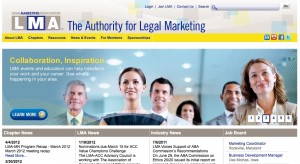Have we reached a tipping point? Can yesterday’s rules hinder a lawyer’s ability to serve their clients today? “Yes,” say the leaders (and members) of the Legal Marketing Association (LMA).
The issues at stake
1. The patchwork quilt of advertising rules across states is exhausting and difficult to maintain in today’s world where multi-jurisdictional practices are common. It’s a huge pain. So, in 2005, the LMA sent its first official position statement to the American Bar Association (ABA) advocating the need for uniform advertising rules for all jurisdictions.
2. The Internet has changed forever the way we communicate with others and how professionals and businesses educate the public about their services and products. For lawyers, the ABA Model Rules of Professional Conduct that relate to advertising and marketing are pre-Web 2.0, and they are simply outdated. Short of the impossible idea that the ABA could regulate the Internet, lawyers and marketers need clarification in the use of new tools made possible by technology in order to comply and still serve today’s Internet addicted clients and potential clients. In 2009, the LMA formed a task force to help move those things along, too.
How it unfolded: The ABA Commission on Ethics 20/20
In 2009, the ABA acknowledged that advances in technology and global legal practice developments were reaching a tipping point, and that a top down review of the ABA Model Rules of Professional Conduct was necessary. The ABA Commission on Ethics 20/20 was established under then ABA President, Carolyn B. Lamm. Their job: Conduct a thorough review.
The final request for comments, on relevant parts of the Commission’s earlier drafts, closed April 2, 2012. The Committee is slated to discuss and finalize their recommendations at the Annual ABA meeting, August 2012. Draft resolutions to date are found here. My earlier summary of the last draft can be found here.
LMA behind the scenes
No shrinking violet, the LMA, aka, The Authority for Legal Marketing, formed a task force to respond to the Commission’s calls for comment. They had these objectives in mind:
- Build a bridge between traditions that the profession holds dear and the reality of all that is new and transformative.
- Respond to the need for LMA members to be conversant with the rules and regulations.
- Show leadership in helping the profession adapt new tools embedded with respect for the profession.
I recently had an opportunity to speak to LMA Executive Director, Betsi Roach, and past presidents Nathan Darling and Kim Perret, to catch up on how the LMA is working on members’ behalf on these important issues.
“The Task Force, created by Nathan Darling, 2010 President, and chaired by Kim Perret, 2006 President, works with the ABA Commission on Ethics 20/20 and with the Florida Board Review Committee in order to ensure that the voice of the legal marketing community is heard on significant issues such as how Internet-based communication and marketing tools can be used in every firm’s marketing mix and the negative impact that state by state rules and regulations can have in this new border free marketplace,” explained Roach.
The timeline goes something like this: Task Force was created in late 2009. Darling presented LMA’s position on the Model Rules review with in-person testimony before the ABA Commission in October 2010 and written comments. Darling and Perret also landed a private meeting with 20/20 Commission co-chair, Jamie Gorelick, to further advocate LMA’s views.
“We believe that our advocacy helped the ABA avoid going further in the wrong direction,” explained Darling. “Our involvement to date also leaves the door open for addressing upcoming issues after the Commission releases its final proposal in August 2012.”
Meanwhile, in 2011, Perret presented official LMA comments to the Florida State Bar Review Board, in a follow up to the 2005 position statement. (Florida currently holds the top award, in my opinion, for particularly irrational standards for lawyers’ Internet use. I say they need all the help they can get.) Moving on…
“Focus on the message, not the medium,” says Darling.
“We’re not just trying to focus folks on the ethics rules, we’re trying to change the way lawyers find and develop business,” explained Perret. “Up for debate is: How are customer relationships actually formed and what role does the Internet play?”
More specifically, areas in debate include:
- Can a customer relationship be formed via a “chat now” screen?
- A Tweet? A blog post? A Facebook status update? (PLEEEEASE, seriously?)
- Pay per click advertisements that offer a “contact us” or application option?
- What role do referral-network links play in engaging new clients?
Darling added,
“At the end of the day, many of the activities on the web equate to educating buyers of legal services about the services you offer. Even when they are found online, lawyers are not forming client relationships without full disclosures, agreements, or in-person identification, appropriate paperwork with signatures, and so forth.
“Federal statutes, heck, the U.S. Constitution, are in place to govern how commerce works. Why should lawyers be handicapped from competing for business within that structure?”
They shouldn’t. I applaud the LMA for their concern and for leading advocacy efforts to help the profession transform itself in the new information economy. Technology renders traditional borders meaningless. State by state regulation of the profession only causes confusion, layers of enforcement (that laughably the Florida Bar intends to delegate to peer policing), and ultimately unnecessary expense for law firms.
For example, an LMA survey, conducted for the purpose of presenting the ABA 20/20 Commission with statistics, revealed that collectively, hundreds of thousands if not millions of dollars in cash and valuable lawyer and staff time ($10-30K per firm of the 194 firms responding) are spent by law firms each year in an attempt to comply with the contradictions imposed by multi-jurisdictional ethics rules regarding Internet use. This is on top of the fact that even many honest attempts at compliance can fall short due to technical shortcomings or misunderstandings. This scenario cannot be sustained, nor should it.
The facts are simple. According to the LMA Task Force:
- People, retail consumers of legal services as well as businesspersons and corporate counsel, seek information via the web as a matter of course, daily. Websites are information on request—not advertisements.
- You can’t paint with one brush. All social media does not constitute solicitation. A distinction must be made between regulating the medium and regulating the message.
Agreed and agreed. Moving on…
What’s ahead for LMA advocacy efforts?
“We will continue to seek ways to advocate in the interests of our members where evolving Internet advertising issues and related topics develop. We are prepared to respond to follow up issues after the August 2012 meeting of the Commission,” said Darling. “And, we are committed to making a difference in addressing the issues that go beyond business development and marketing, including ongoing questions related to professional ethics and law practice management. We believe this is an area where marketers can and must show leadership. Marketers can play a critical role in leading their firms, ethically, as they adapt their practice to compete in the 21st century.”
The LMA also informed me that in the near future they will have a section on its website devoted to reference information on the Model Rules, state-by-state rules, and the ABA 20/20 Commission. An ethics program via webinar is planned for the Fall of 2012 and an in-person session at the 2013 Annual Conference to be held next spring in Las Vegas, Nevada, is in development.
I am impressed by the advocacy efforts of the LMA. I’m also relieved to learn that marketers have a seat at the table. That’s right…we’re not just planning parties and printing nametags anymore. The very large and venerable profession appears to now recognize that diversity of voice is important for a healthy transition to the realities of new media and marketplaces. Darling and Perret reported that the Commission has been very open and objective in regard to their contributions. This surely is worth great recognition to all involved.
I encourage all lawyers and marketers to consider joining the LMA and receiving membership benefits. If you have further interest or questions, please feel free to contact the LMA directly. They will be more than happy to assist you. (Disclaimer: I am an LMA member but hold no official role in the organization and receive no compensation for endorsement. Simply a cheerleader on the sidelines for a great organization.)
But wait…there’s more!
During my discussion with Darling and Perret, I asked, “Who owns the issue of liability in the law firm? HR? Marketing? Management? Lawyers? What are professional liability insurers saying?” Good questions. As far as we know, they’re not saying much right now. So, while it may be a sleeper issue for the moment, what happens when the House of Delegates approves the ABA Model Rule changes is anyone’s guess. Will there will be some trickle down effect? Might insurers require a social media audit before a law firm’s policy gets renewed?
In a follow up post here on the VMO, we’ll imagine that a managing partner gets a memo from Chubb or Attorneys’ Liability Assurance Society, Inc. (ALAS) that reads like this: If you have a Facebook page, take it down now because we will not cover any social media-related mal-practice claim etc, etc…GULP.
Can the marketer (or LMA) be a bridge to liability issues that are CRITICAL to the marketer’s toolbox?
Hmmm… Sign up to receive the VMO in your mailbox or RSS reader so you won’t miss a post!






Excellent post, Jayne. I am pleased as punch that LMA has taken such a strong role and contributed mightily to the dialogue on this subject. The biggest tipping point is undoubtedly the ease of sharing information across the Internet and through social media; it is ridiculous to try to apply the outdated advertising rules to these delivery channels. And I’d argue it undermines the credibility of our industry in the business world, where innovation and transparency reign. Also, 2011 was the first year I’ve had to answer questions on our website and social media usage for our professional liability renewal. I don’t just think that’s coming soon; I think that’s here now.
Kathryn, thanks for the comment. (it got caught in the spam blocker-ugh!) So, I’ve completed my research on the insurance question and have begun drafting a summary of findings. You experience of having to answer questions for a policy renewal was echoed by Bradley Shear, an attorney I spoke with. Thanks for the information.
Yes, Russell, you nailed it. Everyone needs to carve out their little bit of power. In defense of Florida, being a resident here, I have to say that we do have the lion’s share of unethical behavior in the legal profession. I could list them, but I don’t have the space for such word count in this reply. 🙂 So, I sort of understand why Florida feels a need to lock down the house with rules, but I also think this may be better approached from the top down. More education on the nuances of professional conduct BEFORE a lawyer takes the Florida Bar exam. There is not one Florida law school that I know of that has a course in marketing best practices. That may be a good place to start. Weed out the bad seed before they have a chance to take hold. Eh?